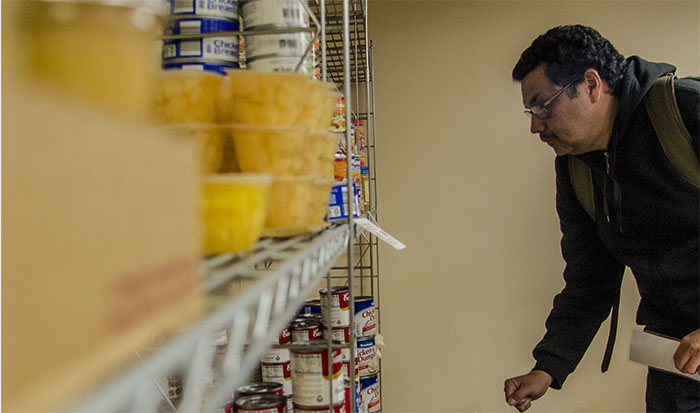SIU food pantry usage three times higher than projected
Guillermo Reyes, a doctoral candidate in education from Nicaragua, browses for food Monday, Nov. 21, 2016, at the Saluki Food Pantry in the Student Center. “I have three children,” Reyes said. “So this is helpful as an international student.” Reyes said it’s hard to make ends meet with an assistantship position. “I have to think very wisely how to spend my money,” Reyes said. He said it’s important to have money saved for an emergency. “My son is 8 years old, and he had two MRIs, the first of which he didn’t have any medical insurance,” he said. “I am still paying the bills. It’s hard.” (Autumn Suyko | @AutumnSuyko_DE)
November 29, 2016
The Saluki Food Pantry is turning out to be a bigger necessity than anticipated.
Since its Aug. 19 kickoff, the pantry has tripled its original projections of serving 100 students per month, according to documents provided by SIU sustainability coordinator Geory Kurtzhals.
Initial projections were based off a research study conducted by SIU graduate Loran Morris, a registered dietician at the Marion Veterans Affairs Medical Center. She polled students at four Illinois colleges to determine if they had “food insecurity.” Morris found that 35 percent of the nearly 2,000 people who responded had food insecurities.
Advertisement
“There is a certain stigma that revolves around going to a food pantry,” Morris said. “This was taken into effect a little too much when predicting the original projections.”
But the inaccurate projections are not university officials’ fault, said Africana Studies professor Joseph Brown, a self-proclaimed advocate for fighting hunger on campus.
“The university cannot solve a problem that is systemic and political and social and health-related,” he said. “We must teach each other that if you see a need, you respond to that need if you are able.”
The food pantry allows SIU students to visit the facility once a month for food items and toiletries by presenting their student IDs, said Sara Sauerhage, a graduate student who serves as the pantry’s coordinator. Donations to the pantry fluctuate weekly depending on the number of students who use it and how much is taken out, she said.
The pantry — which is open from 3 to 6 p.m. Mondays and 10 a.m. to 1 p.m. Tuesdays — gave out 850 to 900 items on Nov. 21 and 22, according to the pantry’s most recent inventory. Sauerhage said this average fluctuates from week to week, depending on pantry use.
In her study, Morris investigated why there is even a need for such a facility on college campuses. She found increasing tuition, fees and cost of living for the average student to be the causes.
“To the average college student, paying bills comes first,” Morris said. “When faced with the decision to eat right or have money, health often takes a back seat.”
Advertisement*
Kayce Landewee, a sophomore from Cape Girardeau, Mo., studying dental hygiene, said the pantry helps her find this balance.
“I really try to value a nutritional meal, and [the pantry] helps me get that,” Landewee said as she stopped by the pantry on Tuesday. “I pay for everything myself, and places like Wal-Mart can get expensive.”
Individual students are allowed to take three days worth of food every month, while those with families are allowed more, according to the university’s website.
For example, if a student has two people in his family, he can take up to 25 items every month, Sauerhage said.
Anna Roczkowski, a junior from Chicago studying dental hygiene, said she stops by the pantry every two months, which makes trying to juggle school, work and shopping easier on her.
“It’s right on campus, so it’s super convenient for me,” Roczkowski said. “As a college student, I take whatever I can get.”
Kurtzhals said the food pantry was created with the ability to be flexible when facing unexpected influxes of students. And in the coming months, the pantry is expected to see some small-scale changes regarding its growth, though Sauerhage said she could not share specifics at this time.
Structural changes will be determined at the pantry’s next committee meeting Dec. 6 to continue its sustainability, Sauerhage said. These changes include looking at students’ needs on a weekly basis, as well as forming better long-term relationships with donors and volunteers, she said.
“No food pantry program can do all that is necessary for those with a problem with hunger,” Brown said. “However, whatever it does is worthwhile and necessary.”
Staff writer Olivia Spiers can be reached at [email protected], 618-536-3325 or on Twitter @_spierso.
To stay up to date with all your SIU news, follow the Daily Egyptian on Facebook and Twitter.
Advertisement








